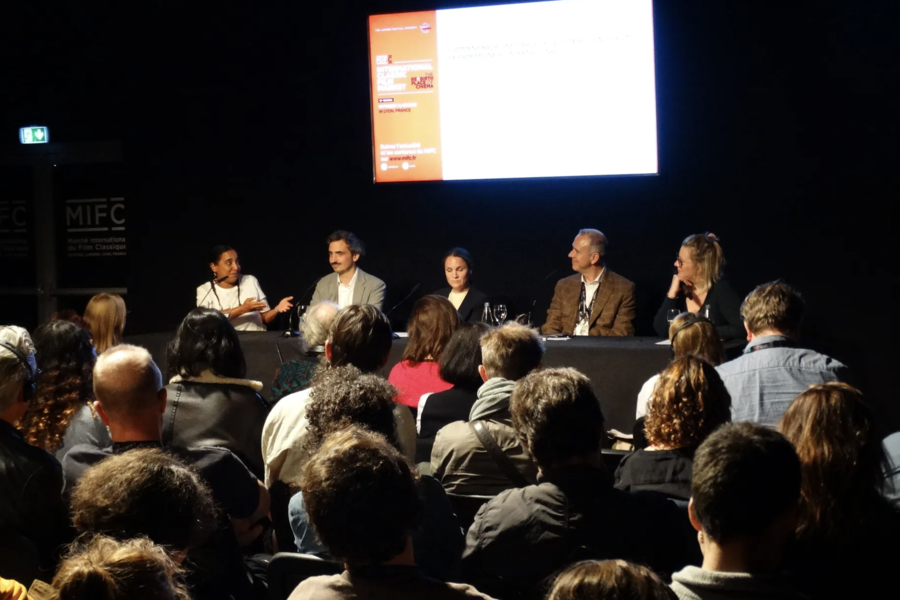How to build an international distribution strategy for classic films?
The round table titled “How to Build an International Distribution Strategy for Heritage Film?” brought together key market players, from distributors to cultural institutions. Moderated by Perrine Quennesson (Journalist), the speakers detailed the selection criteria, release strategies, and management of their vast catalogs. Participants included Aurore Auguste (Acquisition & Manufacturing Project Manager, Institut Français), Benoit Claro (Collections Marketing Director, Mk2 Films), Douglas Davis (CEO, Park Circus), and Pauline Saint-Hilaire (International Sales Director Catalog, Studiocanal). The discussions shed light on the complexity of bringing classic cinema up to date, whether through 4K restorations, targeted marketing operations, or institutional partnerships worldwide.

I. Selection Criteria and Catalog Construction
The creation of the "line-up" is based on a plural and strategic approach:
-
Key Opportunities: The main triggers for re-release are major anniversaries (of birth, death, or the film), historical events, and festivals that serve as a springboard.
-
Technical Imperative: Restoration (mainly in 4K) is deemed essential to ensure the quality and commercial appeal of heritage films.
-
Editorial Approach: Selection is guided by new acquisitions, the creation of thematic collections (e.g., women's films) or cycles by filmmaker, and the editorial affinities specific to each distributor.
II. Commercial Release Strategies
Distributors treat heritage films with a level of care comparable to that of a new film, adapting their strategy to the markets:
-
Dedicated Marketing: Dedicated teams produce a complete promotional kit for international buyers (new posters, trailers, press kits). The objective is to offer a turnkey solution.
-
Chronology and Coordination: The release strategy follows a classic path (festivals → theaters → video/platforms), aiming for international coordination and sometimes simultaneous releases.
-
Adaptation to the Territory: The strategy and scope of the release are adapted to the film's typology and the potential interest of each market, because "not all films work everywhere" (Park Circus).
III. Catalog Backlist Management (Commercial Approach)
Beyond the re-releases planned in the annual line-up, distributors ensure that their catalog remains vibrant and accessible:
-
Reactive Accessibility: The catalog is available for ad hoc requests from exhibitors or distributors. Access is facilitated by availability lists and good knowledge of existing material (DCP, subtitles, etc.).
-
Continued Exploitation: Rights are retained by the rights holders (rarely sold definitively), which allows them to be exploited widely and over time, often via specialized partners.
-
Locomotives and Customer Demand: The anniversary of a flagship title serves as a "locomotive" to highlight a director's entire body of work. Restorations can also be initiated to meet the specific demand of niche distributors.
IV. The Non-Commercial Model of the Institut Français
The Institut Français (IF) operates according to a distinct model serving cultural diplomacy:
-
Mission and Budget: The IF is the operator of the Ministry of Foreign Affairs, financed by state subsidies. Its objective is to promote French culture, with heritage being a major draw.
-
Rights and Network: Purchase of non-commercial, non-exclusive rights for very long periods (around 7 years) for a very vast international network (around 140 countries). Films are made available via the secure platform IFCinéma.
-
Distribution Framework: The IF always gives priority to commercial distribution. If a commercial agreement is reached in a territory, the non-commercial distribution is immediately withdrawn. Screenings must not generate any profit (revenues serving only to cover local operating costs, such as room rental).




